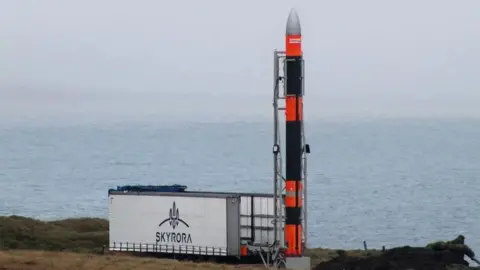The recent approval of a space launch licence to a Scottish company marks a significant milestone for the UK’s burgeoning space industry. Skyrora, an innovative firm based in Edinburgh, has become the first UK-based company to obtain such a licence. This regulatory blessing was granted by the Civil Aviation Authority (CAA), thereby allowing Skyrora to conduct launches from the SaxaVord Spaceport located in Shetland, a region designated as a promising hub for aerospace activities.
The significance of this license is enormous. If Skyrora successfully launches its suborbital rocket, Skylark L, it would establish itself as the first British entity to manufacture and launch a rocket into space from the United Kingdom—a pivotal moment for both the company and the nation’s space aspirations. Skyrora announced its excitement over this historical achievement, classifying it as a “huge milestone” not only for the company but for the UK space sector at large.
Located in Unst, North Shetland’s SaxaVord Spaceport, which was previously an RAF radar station, is being repositioned as a critical launch site for commercial rocketry. Skyrora plans to perform up to 16 launches per year by 2030. The spaceport is gaining traction, with a number of companies eyeing it for future launches. In fact, earlier this year, German company Rocket Factory Augsburg (RFA) was awarded the first launch operator licence from SaxaVord, exemplifying the competitive landscape in the UK space venture arena.
The Skylark L, which Skyrora is set to launch, has garnered attention for its design and capabilities. Standing at 11 meters tall, the rocket is powered by components that are 3D-printed, emphasizing modern manufacturing techniques favoring efficiency and reduced costs. It can reach speeds of up to 3.5 times the speed of sound and promises an exciting trajectory that involves achieving an altitude of approximately 310 miles (500 kilometers) before descending back to Earth—an endeavor that includes traversing the boundary of space.
Rob Bishton, the chief executive of the CAA, praised the issuance of the launch licence to Skyrora, stating, “Granting a home-grown company its launch licence is a major milestone for our space sector and our nation.” He reinforced the importance of regulatory oversight that balances the excitement of innovation with public safety.
Volodymyr Levykin, Skyrora’s chief executive, expressed his appreciation for the diligence of the CAA in providing a comprehensive and rigorous licensing process. He conveyed that their achievement reflects not only the dedication of the entire Skyrora team but also the promising future of the UK in space exploration. Levykin stated, “Safety is paramount to us,” indicating that while they are eager to launch, they remain committed to the highest standards of safety and regulatory compliance.
Scottish Secretary Ian Murray MP also hailed the licence approval as a “massive boost” for Scotland and the UK’s space sector, expressing pride in the role Scotland plays in pioneering space technology. The recognition of SaxaVord Spaceport as a potential launch site epitomizes Scotland’s growing stature in the aerospace industry.
Nonetheless, the journey to this launch licence has not been without challenges. Last year, a notable incident during a hot-fire test at the spaceport resulted in an engine explosion, which caused damage to the launch platform. Such setbacks highlight the complexities involved in aerospace endeavors and the necessity for prudent safety measures.
In summary, the achievement by Skyrora not only highlights its ambition and innovation in the aerospace domain but also symbolizes a new chapter for UK’s space ambitions. The SaxaVord Spaceport is quickly establishing itself as a key player in global space activities, promising exciting future developments in a sector that supports tens of thousands of jobs across the nation. As companies like Skyrora and RFA gear up for launches, the UK’s reputation as a growing space nation becomes increasingly solidified.












